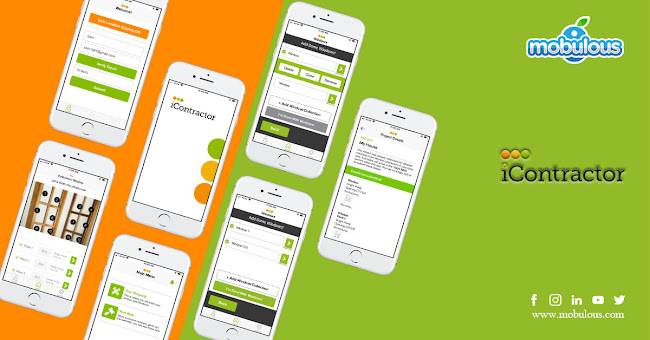The Role of DevOps in Mobile App Development
We are very well aware of the fact that mobile applications are a tech magnet that attracts us for some assistance in our daily life. While speaking of mobile application development, you would find yourself surrounded by the fact that this industry is witnessing a huge boom, as more and more companies are venturing and taking the plunge and investing in mobile app development.
Meanwhile
developing a mobile app for any kind of business or industry, it is very
important to know that while developing one, certain communication gaps are
witnessed which makes the process slow and lengthy.
Before knowing what role does DevOps play in mobile app development, let us
have a brief as to what is DevOps?
These
apps are developed at different times by different teams. And to bring them on
the same page, DevOps plays a collaborative role between the app developers,
project managers, and stakeholders. and members of operational staff.
Taking
down the silos will enable more effective collaboration. It aims to bring clarity
and improve the application delivery and its deployment.
It
helps the developers to design software that has high-quality features while
also maintaining fewer silos to work efficiently. This enables all the key
features such as testing, automation, continuous integrations, continuous
observations, and all these in sync.
The following are its roles in developing mobile applications:
1. Efficient use of resources
New build, fast features delivery, and updates can be easily
achieved when operations and development teams work seamlessly – something that
every best mobile app developer follows DevOps promises.
The extensive use of automation is another element that
promotes resource utilization that is efficiently. Automation is a key
component of DevOps, used across the board from source code management to
development platforms and testing tools to enable quick and frequent releases.
2. The entire procedure is automated
Everything in mobile DevOps is automated, from requirement
gathering and design through implementation and monitoring. This will enable
you to create high-quality applications more quickly than ever while ensuring
that they meet user and business requirements.
Create an automated procedure that runs on each commit or
merging request (MR). By doing this, you can identify any problems before they
have an impact on the outcome.
So that you don’t have to repeat the same task or process again.
3. Continuous Testing
Instead of using actual devices, simulators are used for the
majority of mobile application testing. Moreover, manual testing is used.
Moreover, manual testing cannot be done for all OS versions due to the sheer
quantity of OS versions.
A mobile app may function fine in a test environment, but it
frequently fails in a real-world setting.
There are numerous potential causes for these failures,
including memory, network issues, power issues, etc. So, to identify the cause
of the issue, developers, and organizations must ensure that continuous
monitoring is carried out using third-party SDKs for logs, crash reports, and
other data.
4. Continuous observation
Before the program is released to the user, developers can
conduct more testing and monitoring thanks to DevOps.
Constant monitoring aids in finding and fixing problems.
Without any human intervention, the development process is stable regardless of
the degree of change. This guarantees that the app is reliable and functions as
intended.
5. Planning and Integration that is ongoing
To finalize the scope of work for developing mobile applications,
the entire mobile app project team, including developers, operations personnel,
the project manager, and other pertinent stakeholders, collaborates
continuously.
Continuous integration makes ensuring that code produced by
one developer merges with code produced by another developer without any
issues. It necessitates regular builds that must be integrated with the most
recent code created.
Together
with continuous integration, you must also make sure that the project
milestones are delivered continuously and on time. This will enable you to
monitor the project's development and choose the launch date. You may also
schedule an appointment with the best mobile app developers like us, to receive assistance with your app
development plans.
6. Continuous Deployment
To
ensure that the software can be delivered at any moment, the method of
continuous delivery comprises sending the program and updates to the production
environment in smaller increments.
In
mobile applications, DevOps ensures that code updates are distributed as soon
as they are created. Continuous delivery's primary goal is to build, test, and
release to the client more frequently and quickly.
All this process is completely automated.
7. Complete accountability
The
goal of mobile DevOps is to unify under one organization all the teams working
on developing mobile applications. For everyone to work as successfully as
possible, this ensures that everyone is aware of the same goals, objectives,
and deadlines.
In
mobile DevOps, each team member is responsible for ensuring quality at every
stage of development. As a result, the final product has fewer defects and more
delighted customers.
The
best way to speed up the development of an app is to divide it up into
digestible chunks and spread it across several teams.
Each
team should be responsible for one aspect of the product, such as the front end
or back end, rather than attempting to manage all of it. This method reduces
lag time and streamlines communication.
Conclusion
It is to be known that DevOps is a modern software
development approach that simplifies the process of developing and deploying a
mobile software application. The
benefits of implementing DevOps are widespread and applying the same approach
is not an easy task to accomplish.
This includes tiring but mandatory countless steps such as planning and
integrations, developments, and deployments with continuous testing and
observations if done right, which will result in a successful and efficient
mobile application.
Mobulous is the best mobile app
developer that ensures and assist you in developing an efficient mobile
application for your business keeping your prerequisites in mind.
If you want to get automate your operations and streamline your process using a
mobile application, to know more about this, contact us now.




Comments
Post a Comment